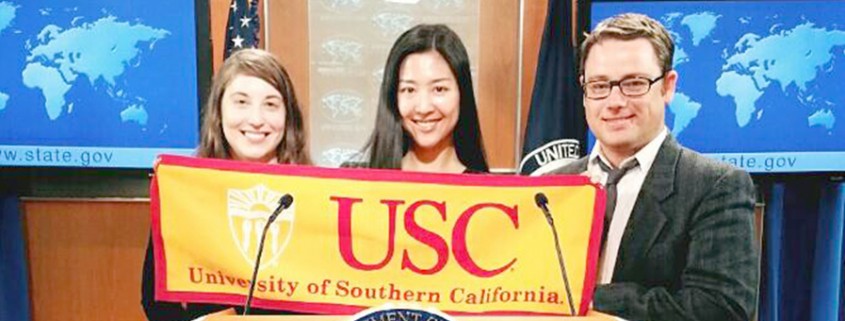When many students left campus last week for spring break, first-year Master’s of Public Diplomacy students Justin Chapman, Jung-Hwa Kang and Amanda Lester headed to Washington, D.C. for a networking tour of America’s capital.
The trip, which took place from March 14 to March 18, was entirely planned by the students.
It was billed as a “roving conference” where the participants received advice, information and even job opportunities from senior practitioners of public diplomacy to share with their classmates.
An MPD tradition over the last few years, faculty serve only the role of connecting participants with experts in D.C. they could potentially meet or sources of funding that may be available.
In their time in the capital, the MPD students managed to make more than a dozen meetings with high-level officials from the Brookings Institution, the U.S. Department of State and many other organizations while also making time to meet with alumni of the graduate degree program currently living in D.C.
Chapman said that meeting Capricia Marshall, a former U.S. chief of protocol and White House social secretary in the Clinton administration who is currently ambassador-in-residence at the Atlantic Council, was one of their most memorable experiences.
“[Ambassador Marshall] told us to grab every opportunity that we can. If someone asks ‘Who can do this,’ say ‘I can,’ then figure out how to do it,” said Chapman, who is also the project fellow at the Annenberg Center on Communication Leadership and Policy. “Make yourself invaluable.”
Marshall’s advice also stuck with Kang, who is still forming her nascent career goals.
Kang said that it set her free from guilt, reinforced the mindset she had been carrying and inspired her to walk out of her comfort zone.
“People often ask me what my plan is after completing the MPD program,” Kang said in an e-mail to the Daily Trojan. “They sometimes raise their eyebrows when I say that I am still exploring and figuring out my path, since I am learning a lot of new things in the MPD program.”
The participants plan to share the information they collected in a report that will be internally distributed to students and faculty in the MPD program. The information will also be used to plan next year’s trip.
Along with building a stronger network for graduate students, the trip also has the intent of attracting interest to USC and the public diplomacy program. The participants had the opportunity to talk about their academic experiences thus far.
“We met with undergrads from Syracuse University who were interested in the program,” Chapman said. “The people we met with now have information and knowledge of the program and can recommend it to students.”
This year’s trip, under the auspices of Annenberg School for Communication and Journalism Dean Ernest Wilson III and MPD Director Nicholas Cull, is one of many that seeks to provide public diplomacy students with opportunities for learning and future employment.
“I see the trip as an important part of the transition to the workplace for students in the program, both because it exposes students to potential employers and because it reminds people in the field of the program and its work,” Cull said.
According to Cull, past networking trips have been taken by MPD students to Vietnam, India, China, Indonesia and Brazil.
But the participants swapped the excitement of an international location with a feeling of validation about their career goals.
“This trip opened my eyes to everything that can be done with the skills I’m learning in the MPD program,” Lester said. “Besides receiving helpful career advice at our meetings, it was inspiring to talk to people who are doing public diplomacy every day, facing its challenges, believing in its promise and still searching for answers to the field’s biggest questions.”




























